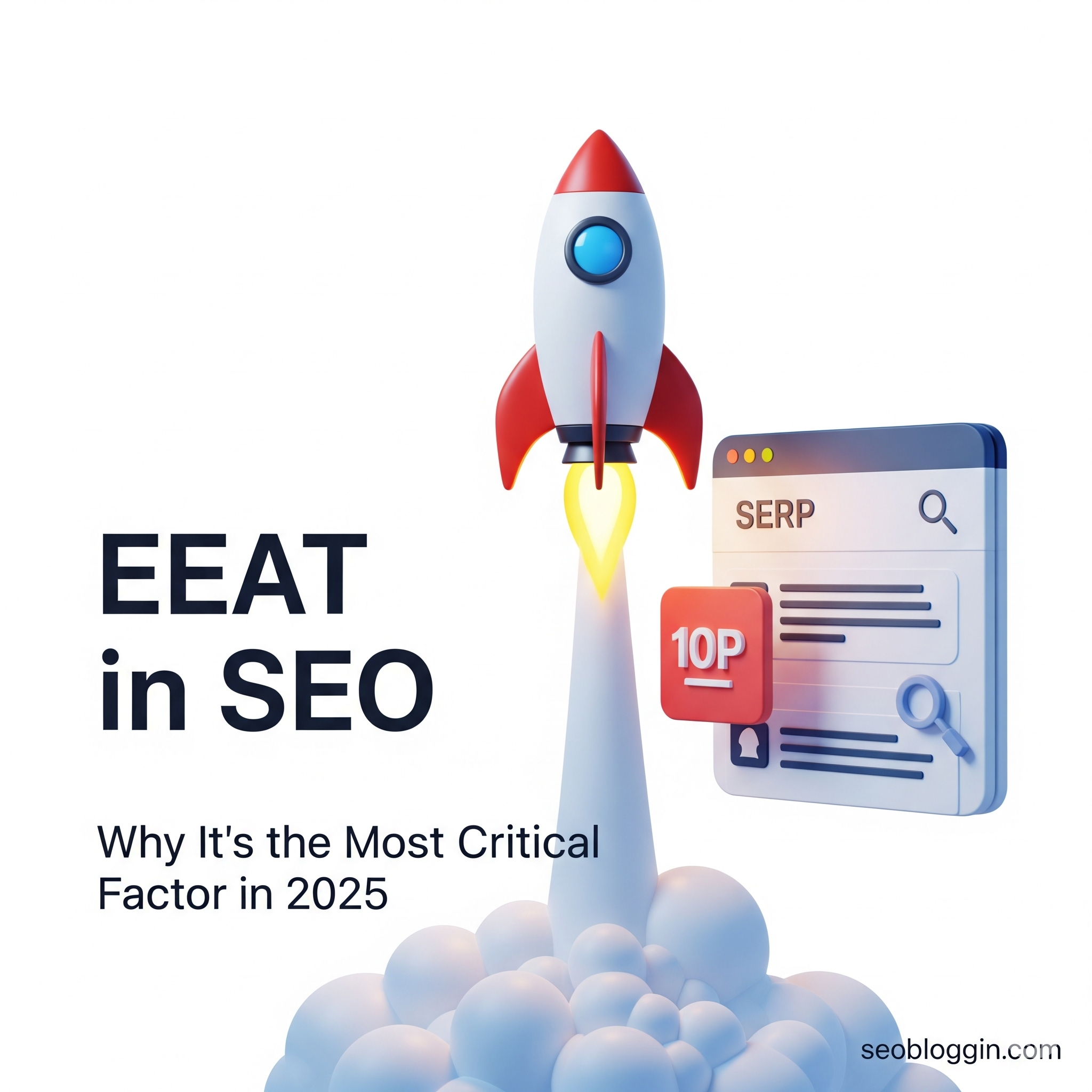Table of Contents
What is EEAT in SEO?
You’ve probably heard a lot about EEAT lately — and no, it’s not a typo. When we talk about E-E-A-T, we’re referring to Expertise, Experience, Authoritativeness, and Trustworthiness. These four elements are the foundation of successful SEO in 2025.
If you’re blogging for beginners or just starting out, understanding EEAT is your first big step toward building a trustworthy blog that Google loves. And if you’re ready to learn how to start blogging the right way, make sure to check out our next article on Blogging for Beginners.
Google now wants more than just keyword-stuffed content. It wants content that people trust, written by someone who knows their stuff, and presented in a way that builds credibility.
Breaking Down EEAT: Expertise, Experience, Authoritativeness, Trustworthiness
- Expertise: Simply put, we need to really know the subject. For instance, if you’re reading about SEO, our content will show we’re well-versed in the field, giving you confidence in the information.
- Experience: Have you actually done what you’re talking about? First-hand experience adds depth.
- Authoritativeness: Are others linking to your content or referencing you?
- Trustworthiness: Is your blog safe, secure, transparent, and fact-checked?
The Evolution of EEAT in Google’s Algorithm
Back in those days, SEO was all about a keyword stuffing strategy. But in 2025, Google cares more about content quality, author reputation, and real user experience. If you’re not focusing on EEAT, you’re basically handing over your rankings to the competition. Want to know how to write an SEO friendly blog post that actually ranks? Keep reading — we’re about to break it down in the simplest way possible.
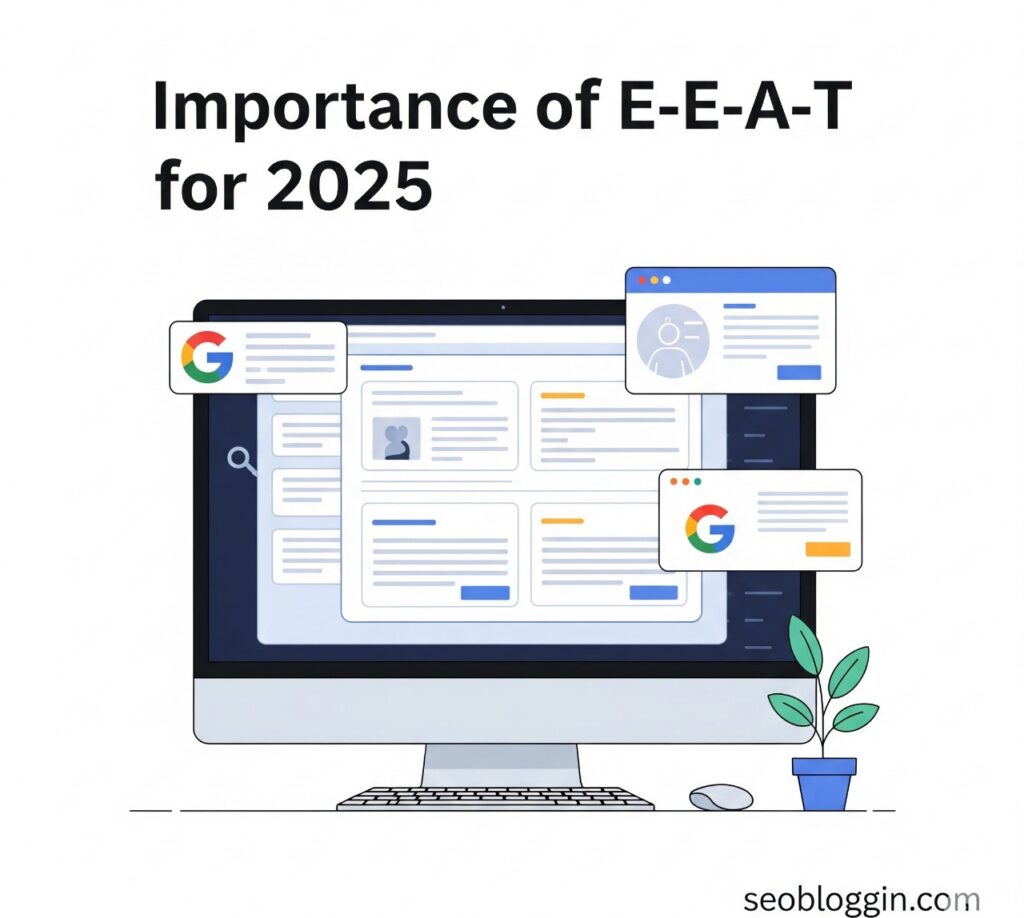
The Growing Importance of E-E-A-T for 2025
Google is cracking down on AI-generated junk content and spammy sites. EEAT helps you stand out by proving that your content is legit, helpful, and reliable.
Google’s Push Towards Quality Content
Algorithms like Helpful Content Update and SpamBrain are rewarding real, human-first blogs. EEAT is how you play by Google’s rules and win.
How EEAT Impacts Blog Rankings
Without EEAT, your blog could be ignored — no matter how great your keywords are. Google checks:
- Who wrote the article?
- Do they have credentials?
- Is the info accurate and recent?
Blogging for Beginners: Understanding EEAT from Day One
Starting your blogging journey? EEAT might sound scary, but it’s actually your secret weapon.
Writing With Credibility in Mind
If you’re new, be transparent. Say you’re learning and sharing what works. Be real. Link to trusted sources. Share your own results.
Establishing Your Online Presence as a New Blogger
Set up:
- A proper About page
- Author bio on every blog post
- Links to your social media (especially LinkedIn)
This quickly builds trust with both your audience and Google.
How to Write an SEO Friendly Blog Post with EEAT Principles
Writing with EEAT doesn’t mean ignoring SEO. You can (and should) do both.
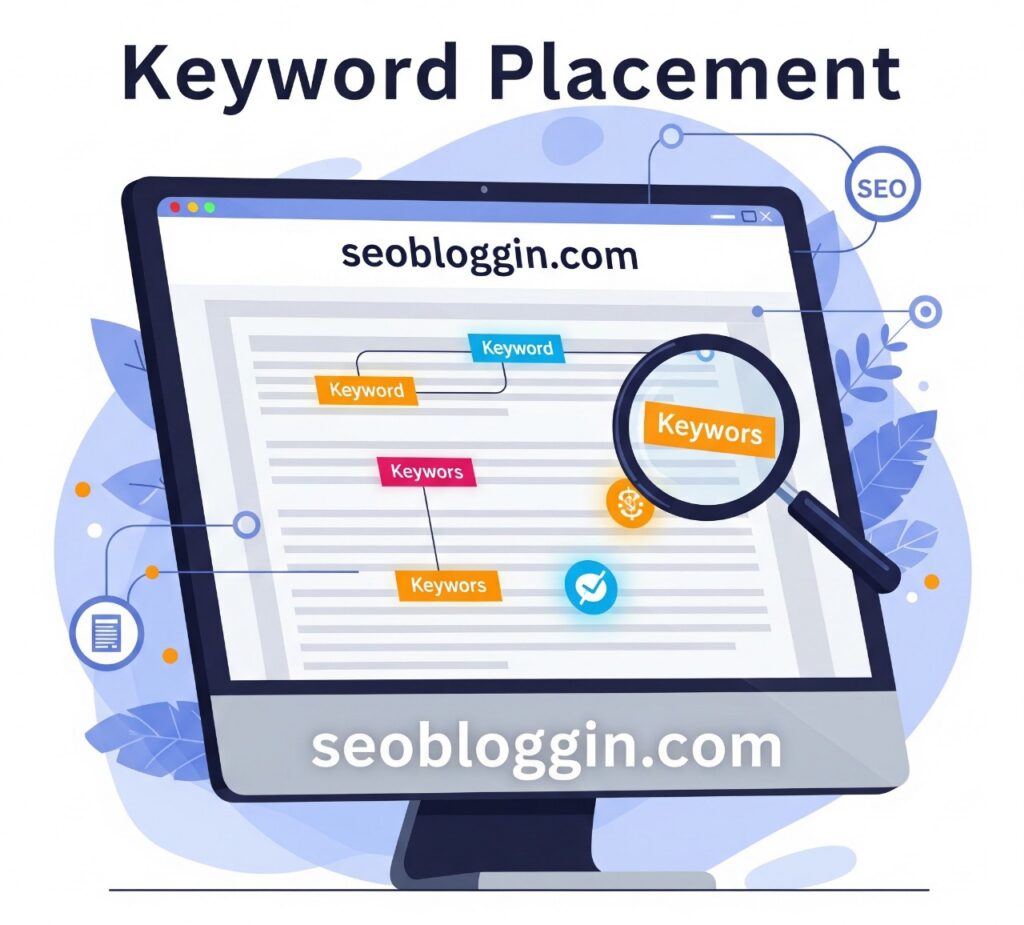
Keyword Placement (Title, H1, First 100 Words)
Naturally include your main keyword (e.g., ‘how to increase blog traffic’) in:
- Blog Title
- H1 Tag
- First paragraph (within the first 100 words)
This helps Google understand your content fast.
Writing Naturally While Staying SEO Optimized
No keyword stuffing. Instead:
- Use variations
- Write like you speak
- Break big paragraphs into easy bites
Use of Author Bio, Links, and Citations
Always include:
- Author name + short bio
- Outbound links to trusted sources (like Google, Moz, HubSpot)
- Cite statistics
It builds trust fast.
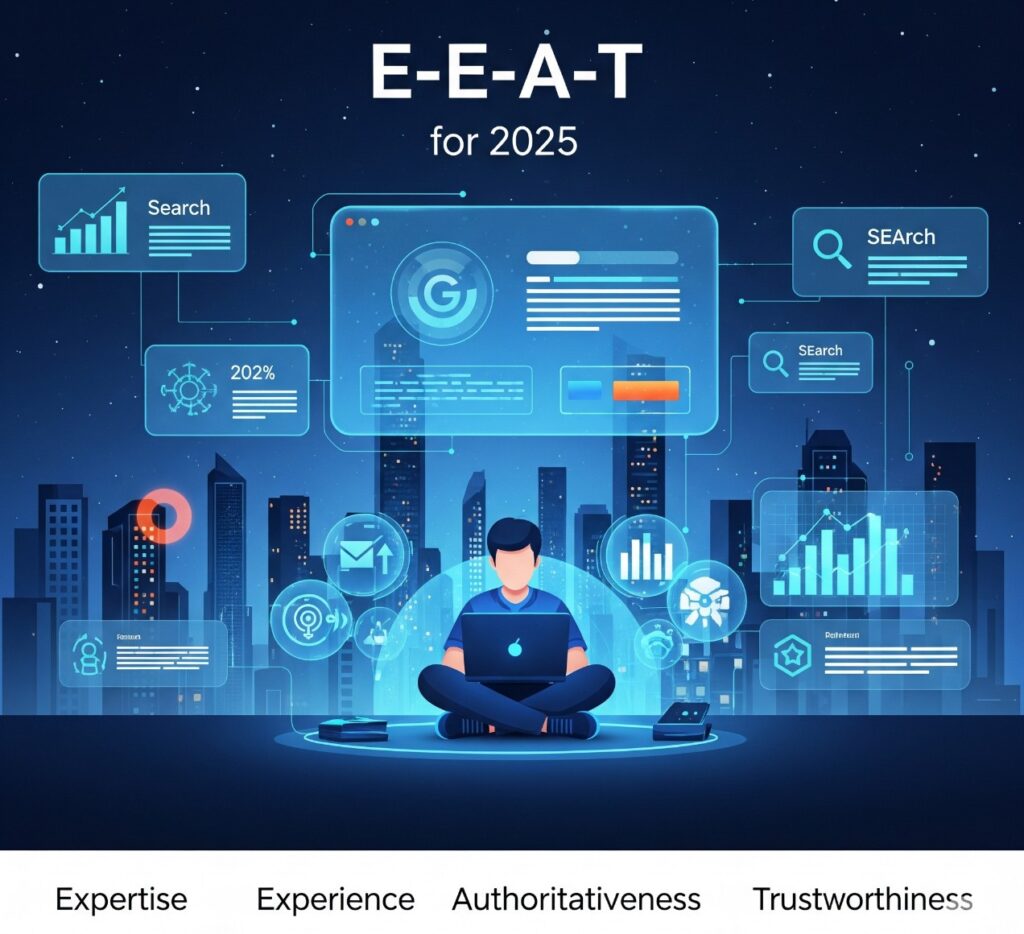
Blog SEO Checklist 2025: EEAT Edition
Want to make sure your blog is fully optimized for Google in 2025? Follow this simple and powerful Blog SEO Checklist 2025 to hit every important SEO mark with confidence.
On-Page Optimization With EEAT Focus
- H1 contains the keyword
- Content is helpful, not just long
- Internal links to related posts
- Outbound links to authority sites
Backlinks, Mentions, and Author Authority
- Get quoted or linked by others
- Collaborate with other bloggers
- Show your credentials
Structured Data and Technical Trust Signals
- Use Schema Markup for:
- Author
- Article
- FAQ
- SSL Certificate installed
- Fast loading time
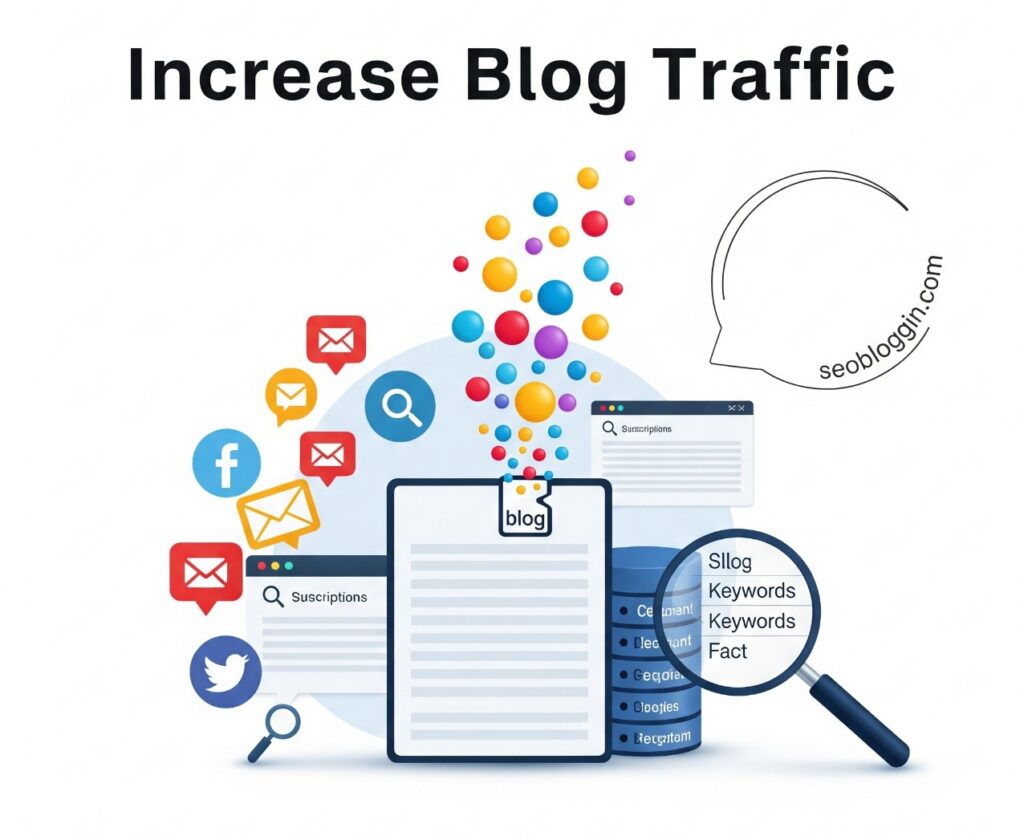
How to Increase Blog Traffic with EEAT
Beyond the technical aspects, SEO is truly about connecting with your audience.
Quality Over Quantity
One detailed, helpful post > 10 shallow ones. Focus on solving real problems.
Building Authority Through Engagement and Shares
Encourage:
- Comments
- Email replies
- Social shares
The more trustworthy your content is to people, the more it is to Google.
Case Studies and Real-World Proof
Share your own results:
- “Achieving 1,000 Visitors in 30 Days: Here’s My Method”
- “This keyword strategy ranked me in 2 weeks.”
It builds experience and trust.
How to Rank a Blog on Google Using the EEAT Strategy
Want to hit page one? Think like Google.
Trustworthy Site Architecture
Your blog should feel safe and professional:
- Clear navigation
- No broken links
- Contact info available
Topic Clusters and Content Depth
Instead of writing 50 random blogs, group your content:
- Main post: How to increase blog traffic.
- Supporting posts: Social media tips, backlink strategies, keyword research
Google Search Console Tips
Use it to:
- Submit URLs
- Monitor keyword performance
- Check indexing issues
Mistakes to Avoid with EEAT in Blogging
Even good bloggers mess up here.
Thin Content and No Author Credentials
500 words with no depth? Google skips it. No author name? Red flag.
Outdated Information or AI Spam
Keep your content fresh. Don’t rely only on AI tools. Add your human touch.
Tools and Tips to Build EEAT Fast
- Use LinkedIn to show expertise
- Add author pages with credentials
- Publish guest posts on authority blogs
Update old blogs to match EEAT standards.
Real Examples of EEAT-Focused Blogs that Rank
Look at blogs like:
- Backlinko
- Neil Patel
- Moz Blog
“It’s more than just writing; it’s about building trust, proving experience, and driving results.“
Future of EEAT in SEO
With AI rising, trust and human insight will be more valuable than ever. EEAT is your way to survive and thrive in the changing landscape.
Conclusion
EEAT is not just a trend — it’s the foundation of SEO in 2025. Whether you’re just starting or you’ve been blogging for years, mastering EEAT can skyrocket your rankings, traffic, and credibility.
Start small, build your trust signals, and always put the reader first. If Google trusts you, your readers will too — and that’s how real success happens.
FAQ’s
Q1. What does EEAT mean in SEO?
ANS- EEAT stands for Experience, Expertise, Authoritativeness, and Trustworthiness, and in 2025, it has become one of the strongest SEO ranking signals. Google uses EEAT to evaluate whether a piece of content is written by someone with actual experience, verified expertise, and a trustworthy background. This means blogs backed by real-life knowledge, transparent author info, and helpful content perform significantly better in search results.
Q2. Why is EEAT so important for ranking in 2025?
ANS- EEAT is crucial in 2025 because Google’s AI-driven ranking systems now prioritize real human value over generic or AI-generated text. The more you demonstrate experience, cite credible sources, provide accurate information, and build authority in your niche, the more Google trusts your content. This trust directly translates into higher rankings, especially in competitive niches like health, finance, and tech.
Q3. How can bloggers improve EEAT on their websites?
ANS- Bloggers can improve EEAT by sharing personal experiences, adding author bios, showcasing credentials, linking to trusted sources, writing deeply researched content, and updating posts regularly. You should also maintain transparency by showing your unique expertise and demonstrating why readers can rely on your insights. Adding testimonials, case studies, or real examples further strengthens EEAT.
Q4. Does AI-generated content affect EEAT in 2025?
ANS- AI-generated content does not negatively affect EEAT if it is reviewed, edited, and enriched by a real human with genuine expertise. Google doesn’t penalize AI content, but it does penalise unhelpful, shallow, or unverified articles. Combining AI tools with human insights, first-hand experience, and trustworthy information ensures your content still meets EEAT guidelines.
Q5. How does EEAT help small bloggers compete with big websites?
ANS- EEAT gives small bloggers a fair chance to rank because Google now values authenticity and real experience more than just domain authority. A small blog with strong EEAT—clear expertise, transparent author info, original insights, and trustworthy content—can easily outrank large websites that publish generic or low-value articles. In 2025, Google rewards quality over size, making EEAT your strongest ranking weapon.

